I'm Not Giving Up On You
Maybe you've seen this awesome YouTube video floating around. If not, take a listen to the PS22 Chorus led by Gregg Breinberg, singing with Andy Grammer.
Look at the faces on the students who are about as engaged as any child can be. These are fifth graders and they are not only having the time of their life, they are making a memory never to be forgotten. What would their school experience be if there were no music opportunities in their young lives?
The former music educator in me can certainly appreciate the skill and organization that propels this group of musicians. But I would argue that the connection made to an art like music is just as important.
As a high school freshman, when my Dad's career took him to New England. it was music that made the culture shock of moving from the comfortable Midwestern community in which I had grown up more bearable. There were friendships that were made in the music room; it was a place where I had something in common with my otherwise foreign New England peers. It was the only place I felt less of a freak or outsider.
What if that safe place that my high school's music program provided had not been available to me? Because I was different, I already felt a lot of teenaged alienation, and yet, the experience of practicing with other students in our orchestra and chorus helped me to belong. And by belonging, I had a pathway in as a student; it made me into an engaged learner which is something that has stayed with me throughout my life.
One of the impacts bothering me about the test-driven curriculum that we see today is that the arts are in increased danger of losing funding during tough budget times. The disciplines of music and art are often looked upon a frills. I would disagree.
While not every student will choose a career as an artist or musician, our schools should be places where students can experience and appreciate the arts in a personal way. Sometimes, as it was for me, that encounter with the arts may become the difference between a dismal and exceptional educational experience.
As the budget season gets underway in our public schools, Gateway communities in Massachusetts are faced decisions about which programs to keep and which will be cut. When municipal school budgets like we see in Gateway cities do not adequately provide for educational expenses, the temptation will always be to jettison the arts. That I believe is not only short-sighted, it is wrong.
The solution, however, is within our grasp. With 25-year-old Foundation Budget formulas driving which programs are funded and which are not, the answer lies with the Legislature's capacity for adopting the Promise Act and for making progress toward fully and adequately funding all of our public schools.
So on May 16, I'll be on the Boston Common rallying with my colleagues to demand our Legislature does the right thing for our students. Somewhere in that crowd might be a young person for whom the arts is a safe way to engage in learning, just as it was for me. I not only won't give up on you. I cannot give up.





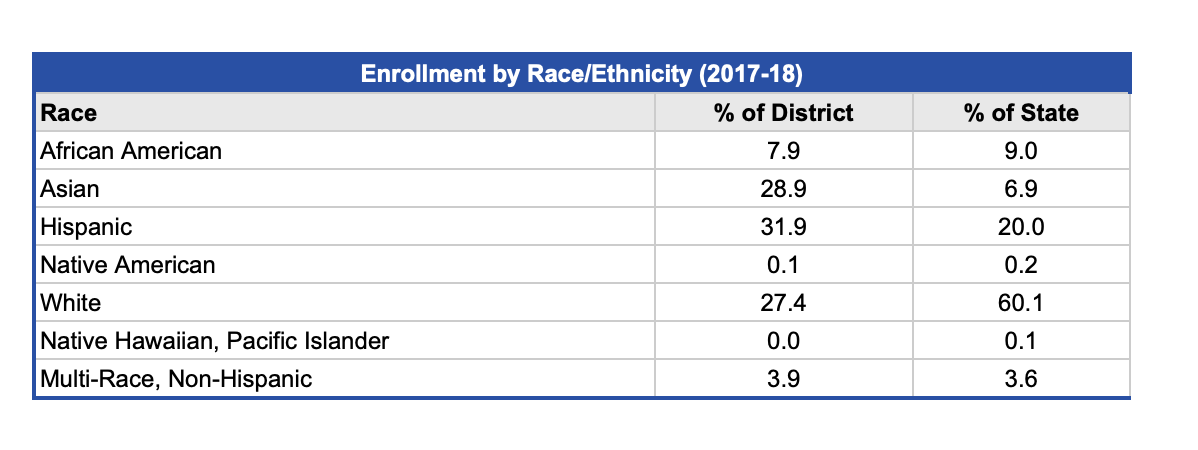
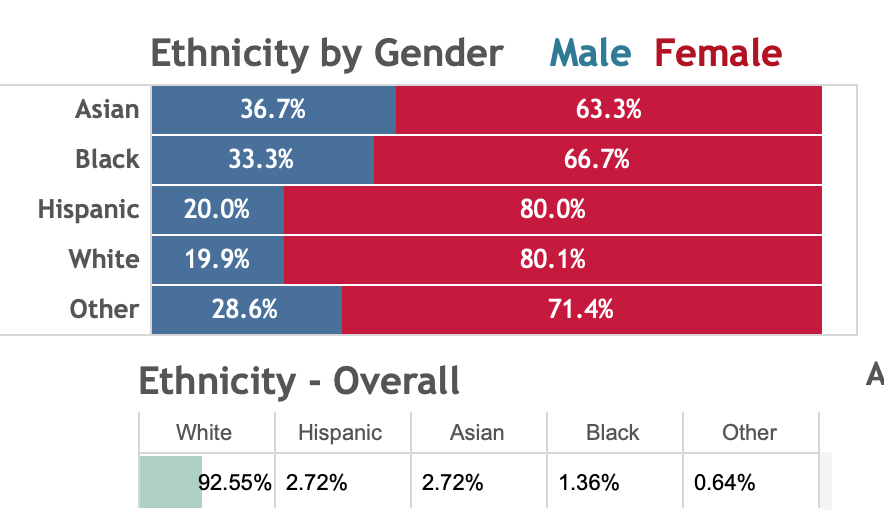
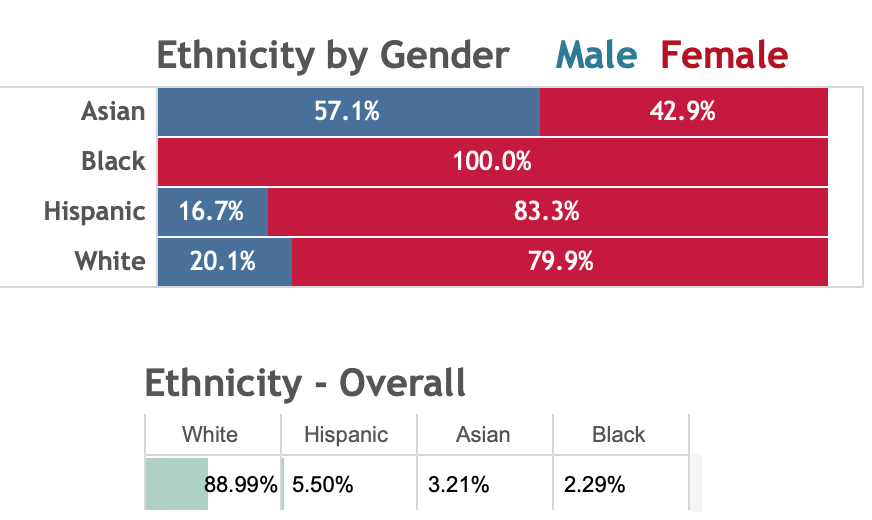
 Don't sit tomorrow's election out. Go vote.Think your vote "doesn't matter". I disagree. Recently in the MA3 Congressional District Primary,
Don't sit tomorrow's election out. Go vote.Think your vote "doesn't matter". I disagree. Recently in the MA3 Congressional District Primary,  Sometimes I wonder if we've lost our collective minds when it comes to early childhood education. This morning, I found this well-written article, from January 2016's Atlantic: "
Sometimes I wonder if we've lost our collective minds when it comes to early childhood education. This morning, I found this well-written article, from January 2016's Atlantic: " Our first grandchild arrived in August, and as many grandparents come to understand, things have changed since we raised our own children. Babies don't sleep with crib bumpers, or on their tummies. Children don't wear winter coats in car seats. I most definitely have zero applicable knowledge when it comes to infants. Times have changed, research has changed, thinking has changed.My wheelhouse, though, is education. I wonder - often as it turns out - if my own thinking as a teacher is outdated. I was reminded of this when a colleague shared the school district's current Early Childhood (PreK) progress report with me - which was over 10 pages long. These 3- and 4-year-olds have been "in school" barely 5 weeks and already their teachers are tasked with assessing their progress.Progress in what, exactly? When one is 3- or 4-years old, shouldn't the ultimate goal be to learn to love learning? To get along with others and take turns? Socialize? A 10-page checklist of skills - by category - seems ridiculous for a little one who has only been on this planet for less than 5 trips around the sun.It did make me curious: what exactly is being asked of young children, so I did some browsing through Boston Public School's Early Childhood page. Check out the "robust questions" intended to spark conversation with 3- or 4-year olds in Centers found in the
Our first grandchild arrived in August, and as many grandparents come to understand, things have changed since we raised our own children. Babies don't sleep with crib bumpers, or on their tummies. Children don't wear winter coats in car seats. I most definitely have zero applicable knowledge when it comes to infants. Times have changed, research has changed, thinking has changed.My wheelhouse, though, is education. I wonder - often as it turns out - if my own thinking as a teacher is outdated. I was reminded of this when a colleague shared the school district's current Early Childhood (PreK) progress report with me - which was over 10 pages long. These 3- and 4-year-olds have been "in school" barely 5 weeks and already their teachers are tasked with assessing their progress.Progress in what, exactly? When one is 3- or 4-years old, shouldn't the ultimate goal be to learn to love learning? To get along with others and take turns? Socialize? A 10-page checklist of skills - by category - seems ridiculous for a little one who has only been on this planet for less than 5 trips around the sun.It did make me curious: what exactly is being asked of young children, so I did some browsing through Boston Public School's Early Childhood page. Check out the "robust questions" intended to spark conversation with 3- or 4-year olds in Centers found in the 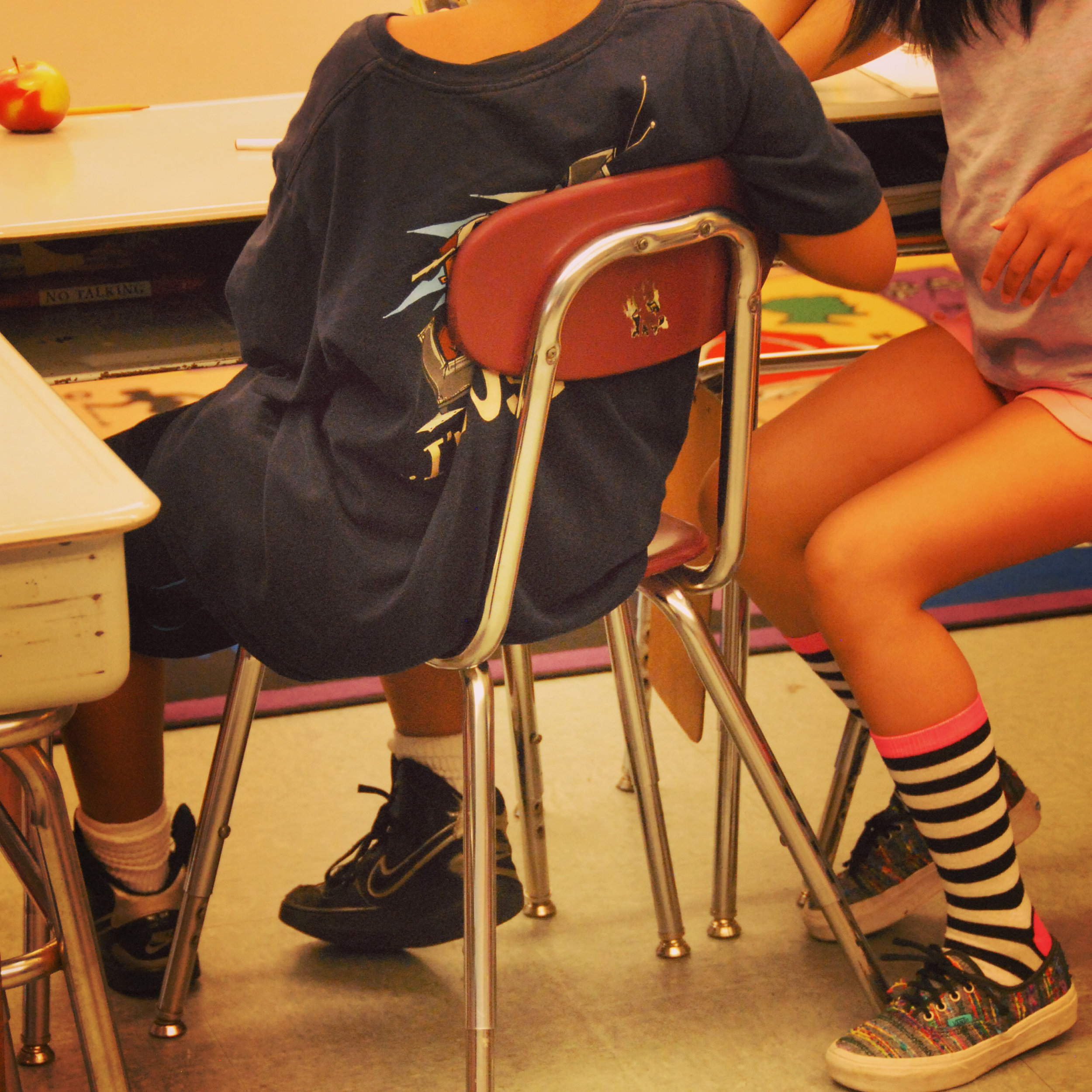 For 30 years, I was a teacher in both private and public elementary schools. I certainly was not a perfect teacher, and I made more than my share of missteps, especially in interactions with students.Experience can be an exacting teacher, however. One of the most important and useful lessons I learned was that for empathetic practitioners, there is no such thing as "zero tolerance". Despite one's insistence that a rule be followed without exceptions, the reality is simply the opposite. In a world of right-or-wrong, black-or-white, there is always a gray space.Take a school's zero tolerance for wearing caps in school as an example. On the surface, such a policy seems simple enough particularly for those of us who were brought up in the generation of "men do not wear caps inside." I share with you an anecdote from my time as an elementary teacher.One morning, a student of mine walked into my third grade classroom just on the cusp of the tardy bell. His head was down, he hadn't gone to his locker, he made zero eye contact with anyone and... he had his baseball cap firmly on his head. This student was a leader, well-liked and respected by his peers and, even at his most challenging, liked by his teachers. When I asked him to take off his cap, as was the rule, he simply looked down and shook his head defiantly.As I was about to escalate this conversation, I was saved from being a jerk by the school's social worker who had cajoled the whole cap story from this child. For some reason, this student's father had taken to giving the child an at-home hair cut, leaving tufts of his hair randomly interspersed between patches of skin. My student was mortified that his friends would see his new haircut and, as kids often do, taunt him mercilessly. So in a nod to the gray area, the zero-tolerance of caps in school was abandoned and the cap stayed on.I tell this story because there is an important take-away for every "zero tolerance" situation, including the one currently unfolding in our government. The consequence of this government's action however is far less benign than becoming an over-zealous enforcer of school rules.Zero tolerance should never become an absolute; there are far too many extenuating circumstances that can and should guide it. It is a lesson our government could and should apply as well.
For 30 years, I was a teacher in both private and public elementary schools. I certainly was not a perfect teacher, and I made more than my share of missteps, especially in interactions with students.Experience can be an exacting teacher, however. One of the most important and useful lessons I learned was that for empathetic practitioners, there is no such thing as "zero tolerance". Despite one's insistence that a rule be followed without exceptions, the reality is simply the opposite. In a world of right-or-wrong, black-or-white, there is always a gray space.Take a school's zero tolerance for wearing caps in school as an example. On the surface, such a policy seems simple enough particularly for those of us who were brought up in the generation of "men do not wear caps inside." I share with you an anecdote from my time as an elementary teacher.One morning, a student of mine walked into my third grade classroom just on the cusp of the tardy bell. His head was down, he hadn't gone to his locker, he made zero eye contact with anyone and... he had his baseball cap firmly on his head. This student was a leader, well-liked and respected by his peers and, even at his most challenging, liked by his teachers. When I asked him to take off his cap, as was the rule, he simply looked down and shook his head defiantly.As I was about to escalate this conversation, I was saved from being a jerk by the school's social worker who had cajoled the whole cap story from this child. For some reason, this student's father had taken to giving the child an at-home hair cut, leaving tufts of his hair randomly interspersed between patches of skin. My student was mortified that his friends would see his new haircut and, as kids often do, taunt him mercilessly. So in a nod to the gray area, the zero-tolerance of caps in school was abandoned and the cap stayed on.I tell this story because there is an important take-away for every "zero tolerance" situation, including the one currently unfolding in our government. The consequence of this government's action however is far less benign than becoming an over-zealous enforcer of school rules.Zero tolerance should never become an absolute; there are far too many extenuating circumstances that can and should guide it. It is a lesson our government could and should apply as well.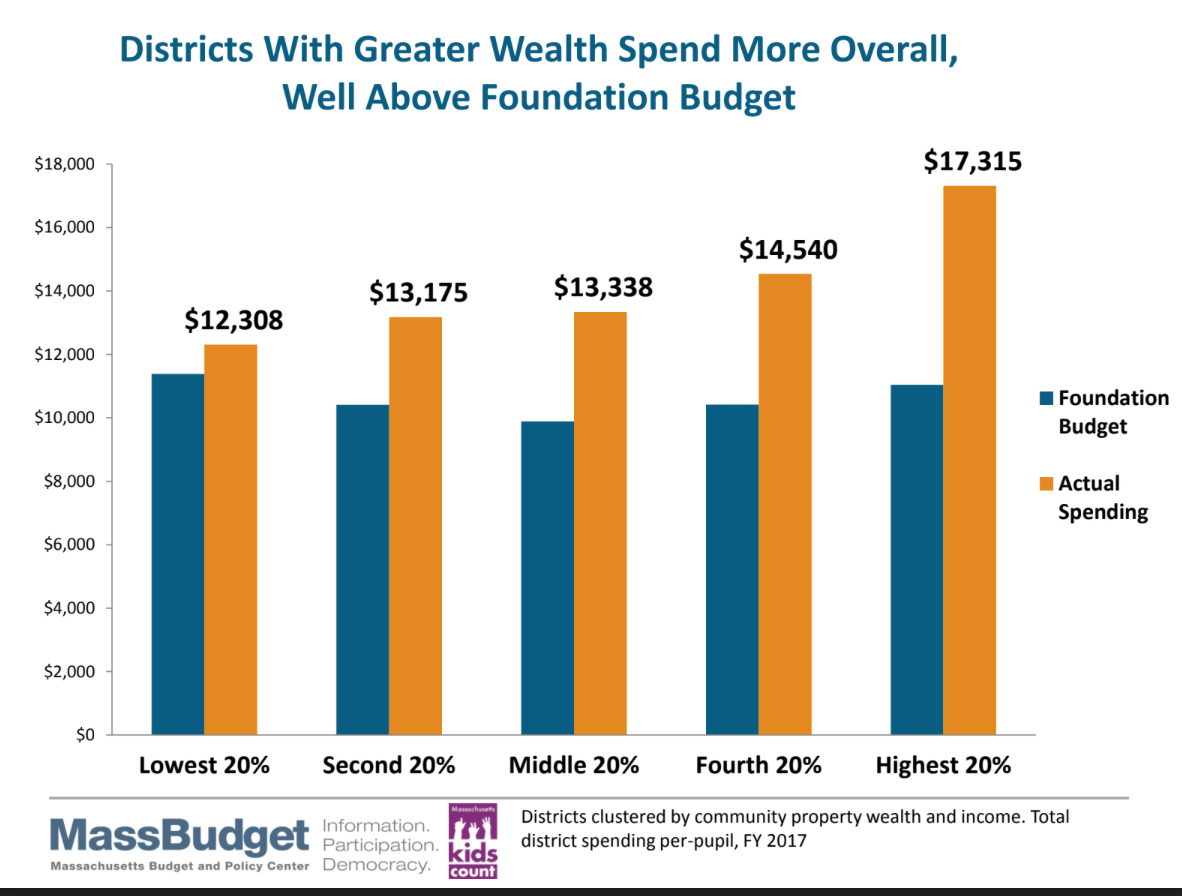 If a picture is worth a 1000 words, this one, courtesy of
If a picture is worth a 1000 words, this one, courtesy of 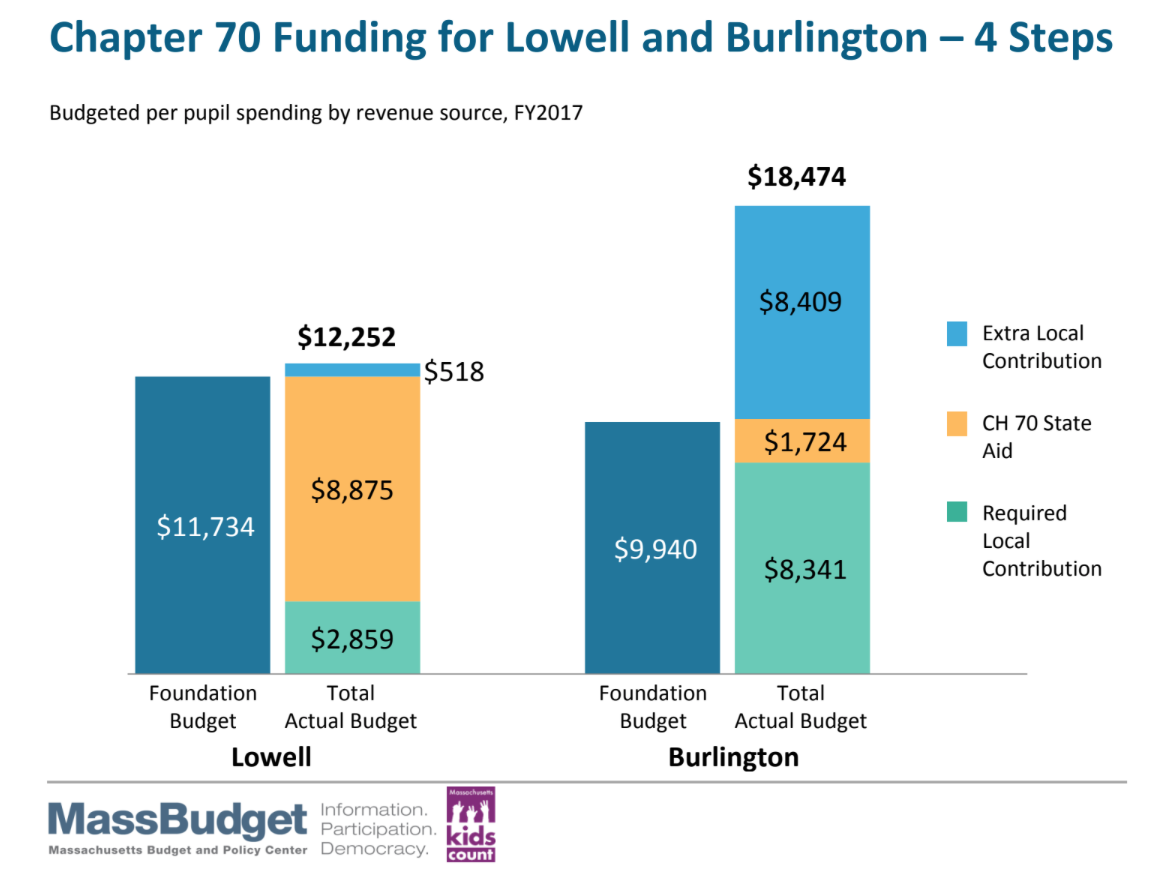 example: in neighboring Burlington, MA, the per pupil cost calculated $9,940. In Lowell, that base number is set at $11,734. Based on the economics of each community, the Commonwealth determined that Burlington's state aid be set at $1,724 leaving the remainder, $8,341, for the Town of Burlington to provide. Recognizing that Lowell's community economics are different from Burlington, the numbers look quite different: state aid is $8,875 and the City's required contribution is $2,859. In an effort the keep this "simple", which it is not, I'm ignoring the whole cash vs. "in kind services" debate.Burlington's per pupil costs are enhanced by the Town's ability to add $8,409 to what Massachusetts has determined is the cost of educating a student in that town. Lowell, with many more demands on its municipal budget, adds $518. So, in the end, Lowell is able to spend $12,252 on every school student (public and charter) while more affluent Burlington can allocate $18,474.This is not just a simple numbers game; it gets worse. Those per pupil determinations that the Commonwealth starts with are based on 1993 (yes, that is correct) formula calculations. So in 2018, the data determining how much each community is expected to expend and raise for each student is already 25 years out of date.The Foundation Budget Review Commission tackled this issue 2 years ago, but the recommendations were not implemented. It was not forgotten by everyone, however, and a refreshed bill, S.2525 unanimously passed the Massachusetts Senate last month. Now it's the Massachusetts House's turn. And this week, with some strong advocacy by Rep. Vega, House members are appealing to Speaker DeLeo to move this legislation out of the House Rules Committee and on to a floor for a vote.Locally, because state funding in education has been whittled away Lowell's kids are on the losing end of budget roulette: our K-8 students will no longer have school libraries, for example.As of this morning, only
example: in neighboring Burlington, MA, the per pupil cost calculated $9,940. In Lowell, that base number is set at $11,734. Based on the economics of each community, the Commonwealth determined that Burlington's state aid be set at $1,724 leaving the remainder, $8,341, for the Town of Burlington to provide. Recognizing that Lowell's community economics are different from Burlington, the numbers look quite different: state aid is $8,875 and the City's required contribution is $2,859. In an effort the keep this "simple", which it is not, I'm ignoring the whole cash vs. "in kind services" debate.Burlington's per pupil costs are enhanced by the Town's ability to add $8,409 to what Massachusetts has determined is the cost of educating a student in that town. Lowell, with many more demands on its municipal budget, adds $518. So, in the end, Lowell is able to spend $12,252 on every school student (public and charter) while more affluent Burlington can allocate $18,474.This is not just a simple numbers game; it gets worse. Those per pupil determinations that the Commonwealth starts with are based on 1993 (yes, that is correct) formula calculations. So in 2018, the data determining how much each community is expected to expend and raise for each student is already 25 years out of date.The Foundation Budget Review Commission tackled this issue 2 years ago, but the recommendations were not implemented. It was not forgotten by everyone, however, and a refreshed bill, S.2525 unanimously passed the Massachusetts Senate last month. Now it's the Massachusetts House's turn. And this week, with some strong advocacy by Rep. Vega, House members are appealing to Speaker DeLeo to move this legislation out of the House Rules Committee and on to a floor for a vote.Locally, because state funding in education has been whittled away Lowell's kids are on the losing end of budget roulette: our K-8 students will no longer have school libraries, for example.As of this morning, only  Senator Charles Shumer and Representative Nancy Pelosi have published their collective ideas supporting public education. Their 5-point proposal can be found in
Senator Charles Shumer and Representative Nancy Pelosi have published their collective ideas supporting public education. Their 5-point proposal can be found in 
 I was in Boston this past weekend to be an ally for the student organizers of March for Our Lives, Boston.I feel as if my generation of Boomers has dropped the ball. Or maybe we never picked up the ball because when we were students in school, worry about an "active" shooter, one with an assault weapon, was not anything to be concerned with. The duck-under-desks drills were more about tornadoes or the Cold War threats from Russian Bombs.Since Newtown and Sandy Hook, it hasn't mattered how young the students, we practice
I was in Boston this past weekend to be an ally for the student organizers of March for Our Lives, Boston.I feel as if my generation of Boomers has dropped the ball. Or maybe we never picked up the ball because when we were students in school, worry about an "active" shooter, one with an assault weapon, was not anything to be concerned with. The duck-under-desks drills were more about tornadoes or the Cold War threats from Russian Bombs.Since Newtown and Sandy Hook, it hasn't mattered how young the students, we practice responses to active shooters several times a year. The protocols and program acronyms, such as the
responses to active shooters several times a year. The protocols and program acronyms, such as the  My goal in creating classroom space was to design a place that supported learning cooperatively, encouraged students to be independent, and was welcoming. Instead, I would start the school year thinking about which furniture should be near the hallway door and how 9-year olds might be able to move it in front of the door. Depending on the students' physical limitations, it was necessary to carve out space for hiding. Teachers made plans for another adult to watch over students in a safe meeting spot in case the worst possible situation presented itself. Teacher might not be with the students and might need to stay back in the classroom hiding with a child for whom running was made impossible by physical disability.
My goal in creating classroom space was to design a place that supported learning cooperatively, encouraged students to be independent, and was welcoming. Instead, I would start the school year thinking about which furniture should be near the hallway door and how 9-year olds might be able to move it in front of the door. Depending on the students' physical limitations, it was necessary to carve out space for hiding. Teachers made plans for another adult to watch over students in a safe meeting spot in case the worst possible situation presented itself. Teacher might not be with the students and might need to stay back in the classroom hiding with a child for whom running was made impossible by physical disability. I am abundantly aware of the ridiculous response to keeping students safe from an intruder carrying an assault weapon into a school building. The response in such situations might mean a lock down. It might mean running. It might mean creating a barricade by piling furniture at the egresses. If the shooter enters the classroom, we teach students to run around, scream, or throw items such as staplers and books in an attempt to distract the intruder.T
I am abundantly aware of the ridiculous response to keeping students safe from an intruder carrying an assault weapon into a school building. The response in such situations might mean a lock down. It might mean running. It might mean creating a barricade by piling furniture at the egresses. If the shooter enters the classroom, we teach students to run around, scream, or throw items such as staplers and books in an attempt to distract the intruder.T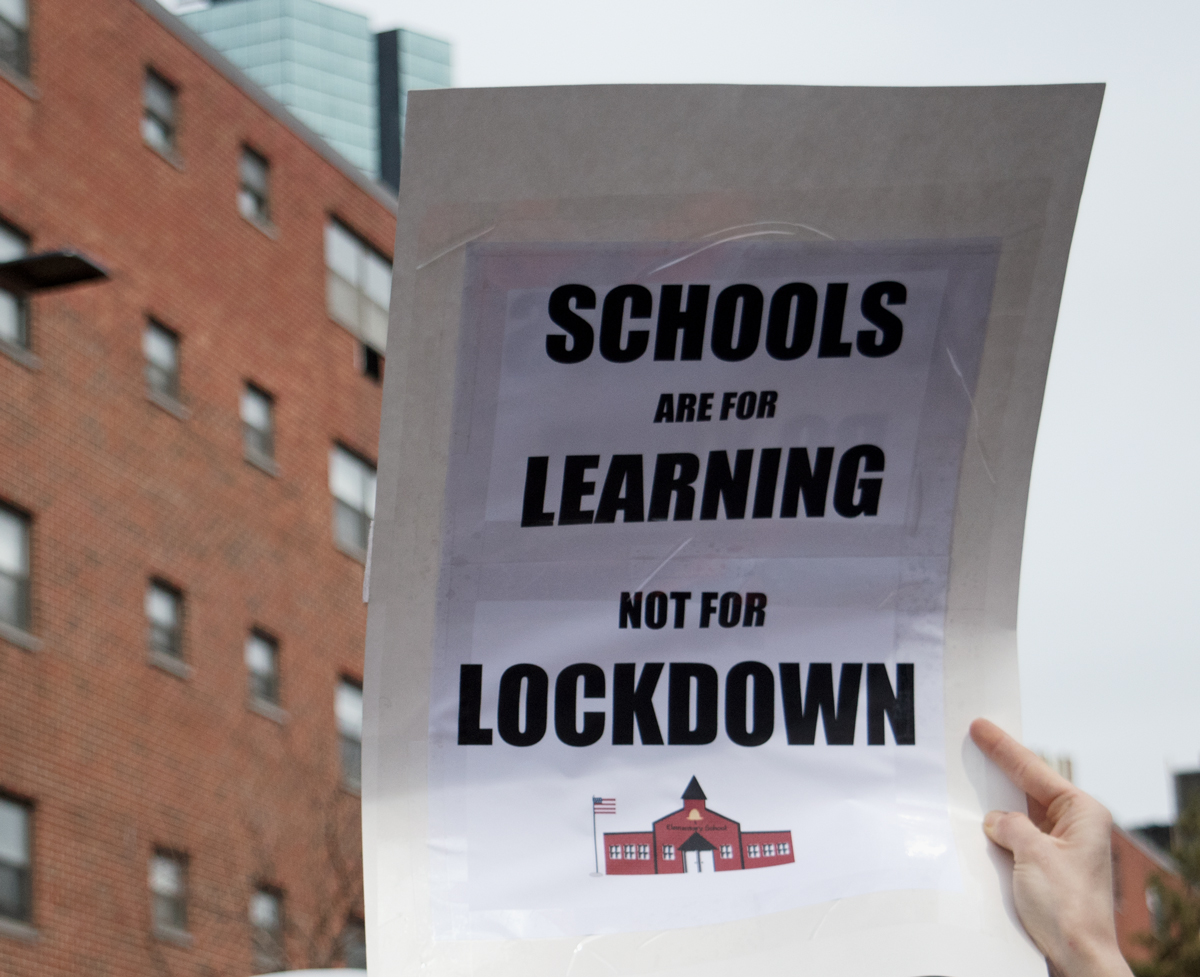 he students know that safety from an intruder armed with an assault weapon is not just an issue for schools. It can happen in nightclubs. It can happen in outdoor concerts. It can happen in churches. An assault rifle can p
he students know that safety from an intruder armed with an assault weapon is not just an issue for schools. It can happen in nightclubs. It can happen in outdoor concerts. It can happen in churches. An assault rifle can p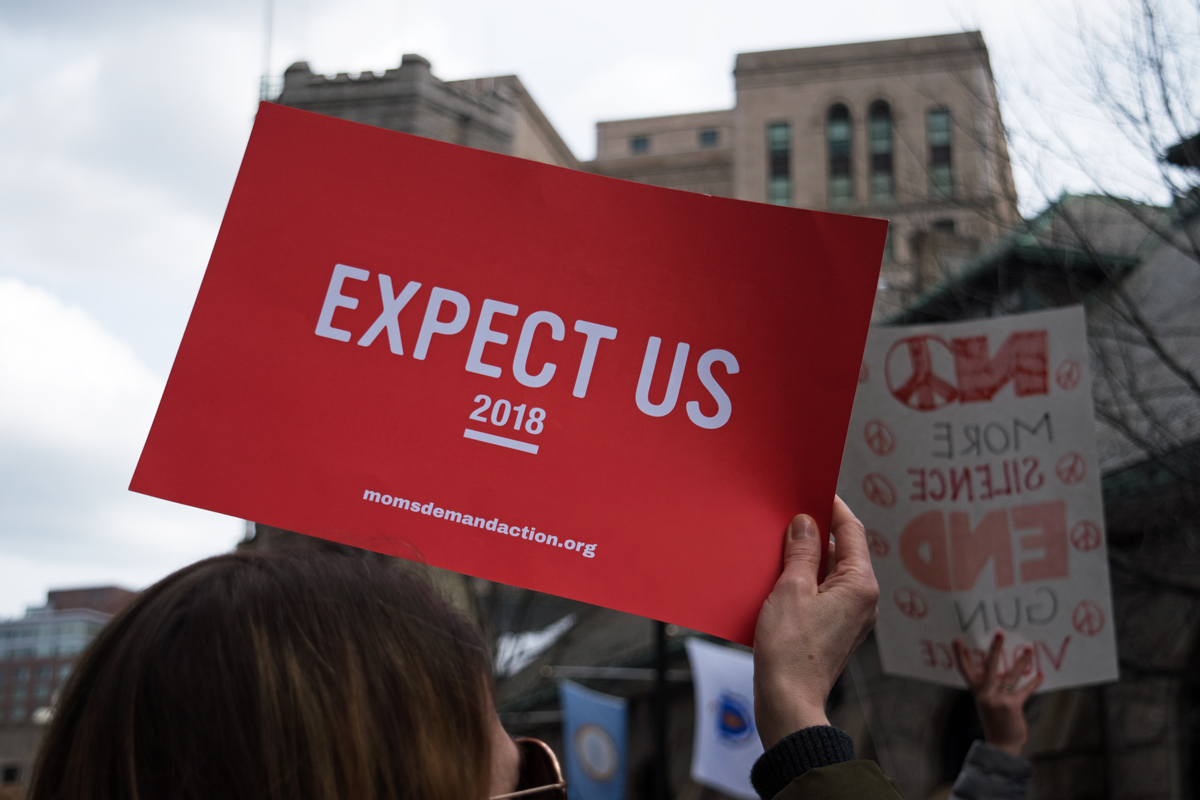 I have yet to hear a cogent argument for allowing the general population to purchase an assault weapon. Assault weapons have no purpose in the hands of the general public. They kill and maim quickly whether one is sitting on a front step or in a park or at a desk in class.Listen to the kids.
I have yet to hear a cogent argument for allowing the general population to purchase an assault weapon. Assault weapons have no purpose in the hands of the general public. They kill and maim quickly whether one is sitting on a front step or in a park or at a desk in class.Listen to the kids. Did you happen upon KQED's interview with San Francisco educator, Michael Essien, principal of MLK Middle School? If not,
Did you happen upon KQED's interview with San Francisco educator, Michael Essien, principal of MLK Middle School? If not,  Some years ago, I enrolled in an Italian language class at Boston Language Institute. The class met for 3 hours - no break - several times each week. The instructor only spoke my "new" language, Italian, for the entirety of the three hours. We had some written materials, some listening resources, but mainly we were expected to immerse ourselves in Italian. If this sounds like what happens in a classroom, I would agree.The first thing I learned from this experience was how utterly frustrating it is for a learner to function outside of his or her native language. But one of the larger experiences for me was the chance to experience what it must feel like for a student to attempt to sustain concentration and focus for extended stretches of time without a break.By Hour 2 of my 3-hour class, I felt hopeless and defeated. I could no longer take another idea into my brain. I left the class with a dull and aching head and lots of questions as to what the goal of that instruction was. If this was my experience with sustained time-on-task learning as an adult, it wasn't hard to imagine the same sense of frustration and defeat applying to the young learners in my classroom.Regardless of whether or not the student is learning in a non-native language, as many of my former students were, extended periods of concentration does not necessarily yield higher academic achievement. Whether adult or child, the brain needs what the brain needs. And in learning new things, the brain needs some time off to make connections and absorb learning.Since the inception of education reform, standardized curriculum, and high-stakes testing, educators have been pressured to prove that students are learning. The proof has, to date, been in the form of high stakes testing. Students, teachers, and schools who do not achieve arbitrary scores indicating that the prescribed curriculum has been mastered are called out. The trickle down response to test scores that are less than stellar has been toward reducing or eliminating children's recess time.Why? Because when test scores look bad, the first response is that the students need "more time" to learn the material. That time has to come from somewhere, so shaving minutes away from recess is the first response. To me, this sounds a lot like what I did as an unprepared college student studying for a final in Western Civilization: cramming.Reducing or eliminating students' active time does not mean better test results. The brain needs some time to process and absorb new learning. Kids who fidget less, focus more.So what our kids need is similar to what my experience as a student proved for me: more recess. Don't take my word for it. Here's a statement from a recent
Some years ago, I enrolled in an Italian language class at Boston Language Institute. The class met for 3 hours - no break - several times each week. The instructor only spoke my "new" language, Italian, for the entirety of the three hours. We had some written materials, some listening resources, but mainly we were expected to immerse ourselves in Italian. If this sounds like what happens in a classroom, I would agree.The first thing I learned from this experience was how utterly frustrating it is for a learner to function outside of his or her native language. But one of the larger experiences for me was the chance to experience what it must feel like for a student to attempt to sustain concentration and focus for extended stretches of time without a break.By Hour 2 of my 3-hour class, I felt hopeless and defeated. I could no longer take another idea into my brain. I left the class with a dull and aching head and lots of questions as to what the goal of that instruction was. If this was my experience with sustained time-on-task learning as an adult, it wasn't hard to imagine the same sense of frustration and defeat applying to the young learners in my classroom.Regardless of whether or not the student is learning in a non-native language, as many of my former students were, extended periods of concentration does not necessarily yield higher academic achievement. Whether adult or child, the brain needs what the brain needs. And in learning new things, the brain needs some time off to make connections and absorb learning.Since the inception of education reform, standardized curriculum, and high-stakes testing, educators have been pressured to prove that students are learning. The proof has, to date, been in the form of high stakes testing. Students, teachers, and schools who do not achieve arbitrary scores indicating that the prescribed curriculum has been mastered are called out. The trickle down response to test scores that are less than stellar has been toward reducing or eliminating children's recess time.Why? Because when test scores look bad, the first response is that the students need "more time" to learn the material. That time has to come from somewhere, so shaving minutes away from recess is the first response. To me, this sounds a lot like what I did as an unprepared college student studying for a final in Western Civilization: cramming.Reducing or eliminating students' active time does not mean better test results. The brain needs some time to process and absorb new learning. Kids who fidget less, focus more.So what our kids need is similar to what my experience as a student proved for me: more recess. Don't take my word for it. Here's a statement from a recent 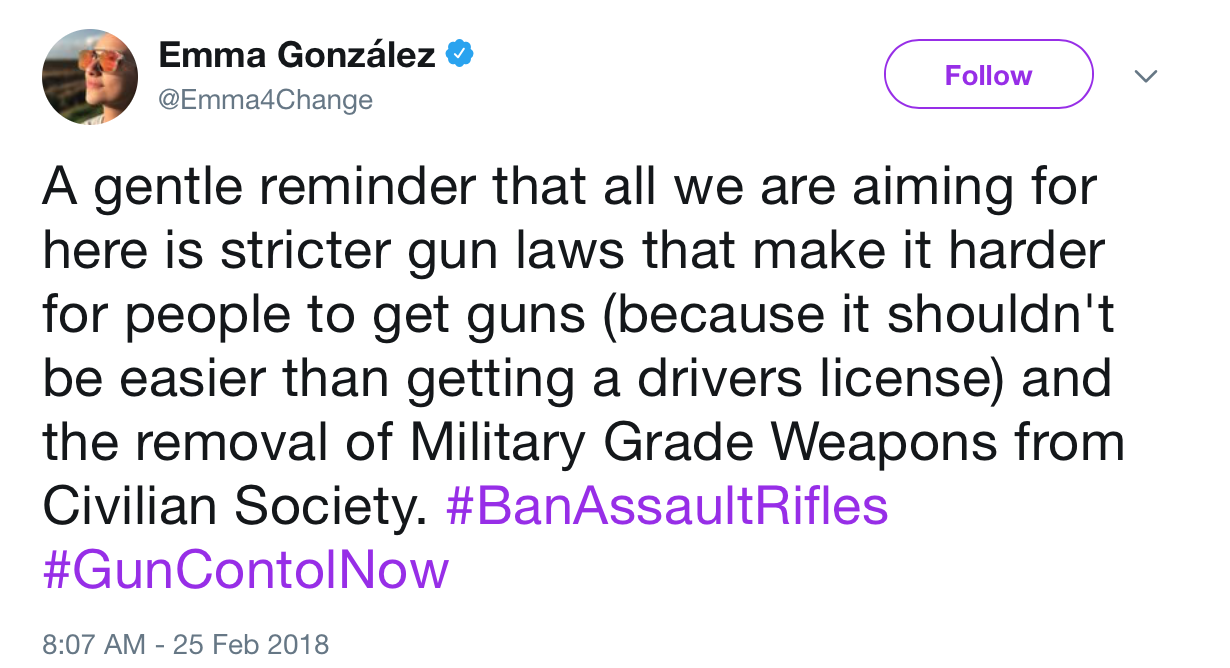
 What will it take to break through the glass ceiling of education leadership in Massachusetts? The answer to that is still to be uncovered.On Monday, the Board of Education met to make a final candidate selection for Massachusetts' next Commissioner of Education. There were
What will it take to break through the glass ceiling of education leadership in Massachusetts? The answer to that is still to be uncovered.On Monday, the Board of Education met to make a final candidate selection for Massachusetts' next Commissioner of Education. There were  Day four's
Day four's 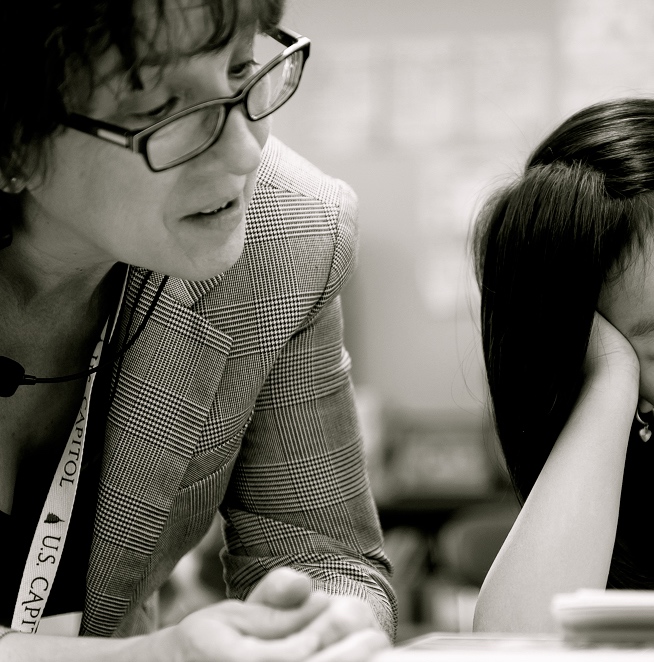 I started reading
I started reading